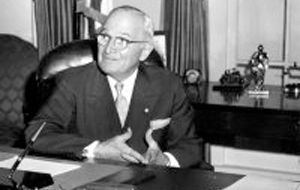MercoPress. South Atlantic News Agency
Mujica promises to control the curse of inflation, but ‘there are no magic solutions’
 Paraphrasing Harry Truman, “the buck stops here”
Paraphrasing Harry Truman, “the buck stops here” President Jose Mujica promised there will be no ‘uncontrolled inflation in Uruguay’ and although admitting it’s not a simple problem, with no magic solution, there are “sufficient tools’ to address the issue including putting “government spending on a diet”.
“To stop inflation it is recommended to put government on a diet with a budget where spending matches effectively collected taxes: the same figure taken from taxpayers is what can be spent; it is what economists in their fancy jargon call fiscal equilibrium, which means living by your means”, said Mujica during his daily morning broadcast.
Mujica said inflation was more than ‘that personal sour feeling when you go shopping and the price of beef has gone up’, because anti inflationary policies are not perfect or neutral since “they will always have an impact on someone whatever you do” and there will be howling and screaming.
However he underlined Uruguay is at a point when it can manage the situation, particularly since the fundamentals of the economy are working very well.
“We’re not going to look sideways, we are going to address the issue head on, with the best techniques possible, with no appeal to extreme policies from fundamentalist theories”, promised Mujica.
The president said he was ready for all complaints and claims that can be expected because many people will be mad: “inflation is a curse, it attacks the poorest: those with fixed incomes, workers, pensioners, the majority of the country; but inflation is also a curse for the good entrepreneurs and investors”.
“Businessmen can increase prices but at the end they are also absorbed by price speculation and it’s a different game for those used to produce”, underlined Mujica.
“We can live with 7% or 8% inflation, no double digit, so it’s worth the effort to contain it” he added recalling that in 2010 there was also an inflationary thrust but “we were able to control it”.
Finally he said it took Uruguay from 1972 to 1998 to bring inflation down from 80% to 8%, “26 years of enormous sufferings for many people, but we Uruguayans battled and finally won. In consideration and respect for that historic effort, I’m saying inflation will be stopped”. Paraphrasing US president Harry Truman, “inflation stops here”.
So far the Mujica administration has applied orthodox measures basically to contain demand: interest rates hike, higher bank reserves, delaying increases of prices the government still administrates (milk, bread, utility rates and fuels), eliminating certain taxes on fuels and meat cuts and facilitating imports of vegetables and fruits.
Unorthodox measures, admits the government, could include a prices containment policy agreed with retail markets such as implemented in 2008 before the global recession.
The current package is similar to 2008, although circumstances not necessarily the same even when world food and energy prices are two-months away from their 2008 peaks previous to the great collapse of financial markets.
The 2011 North Africa/Middle East political turmoil has sent oil prices and uncertainty soaring, while commodities volatility persists fuelled by the abundant liquidity.
The Uruguayan economy expanded 8.5% in 2010, domestic demand is particularly strong and there’s a lack of qualified labour. In 2008 the economy was expanding at 8.6%, exports booming and so were export commodities’ prices.
But, a big but, the Uruguayan treasury had in 2008 a fiscal surplus of 0.9% of GDP, while on this occasion it’s a 1.4% GDP fiscal deficit. Back then inflation was brought down from over 9% to 7.2%, with another bout in 2009 which was finally contained with unorthodox measures such as the prices-containment agreement.
In March 2011 inflation reached 8.17%, following on a long gradual increasing tendency since December 2009, with the additional factor that higher rates and a weakened US dollar, has investors taking refuge in Uruguayan pesos.
This means the US dollar in the Uruguayan market has fallen to its lowest since 2001, which is severely impacting on the competitiveness of Uruguayan exports, which is relatively sustainable for manufacturing since Brazil is the main client and has a currency which has appreciated even more against the US dollar and is attracting a massive inflow of imports.




Top Comments
Disclaimer & comment rules-

Read all comments“To stop inflation it is recommended to put government on a diet with a budget where spending matches effectively collected taxes: the same figure taken from taxpayers is what can be spent; it is what economists in their fancy jargon call fiscal equilibrium, which means living by your means”
Apr 15th, 2011 - 07:00 pm 0This man is AMAZING.
He has enunciated the key economic principle of all time.
If he can do it without a revolution he will have succeeded where most developed world economies have spectacularly failed.
Good luck - I hope he succeeds.
Commenting for this story is now closed.
If you have a Facebook account, become a fan and comment on our Facebook Page!